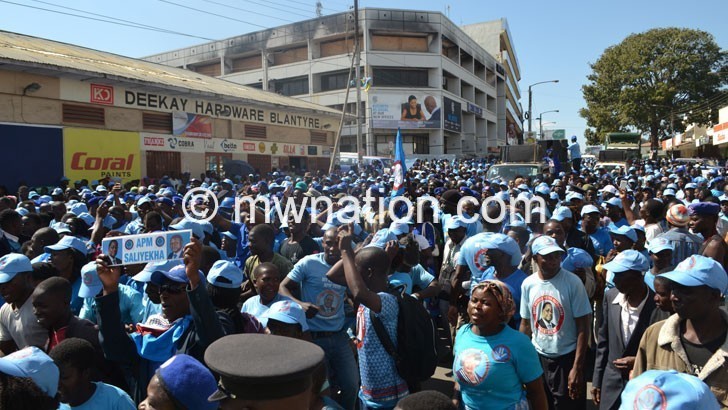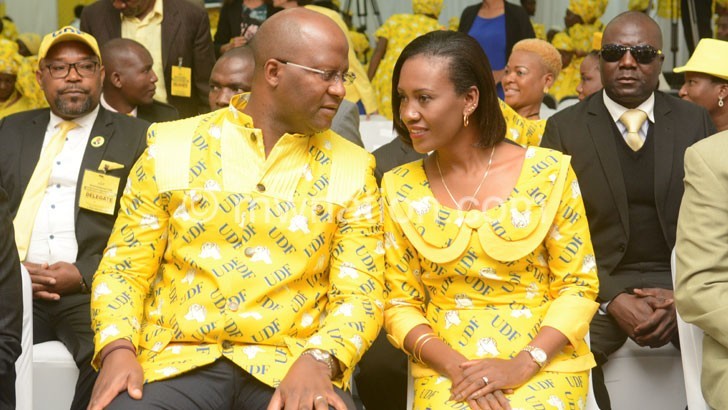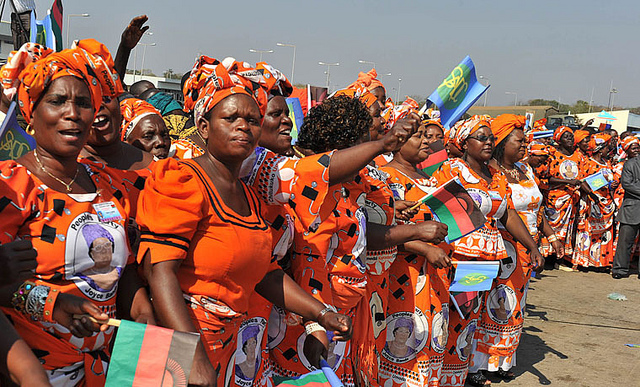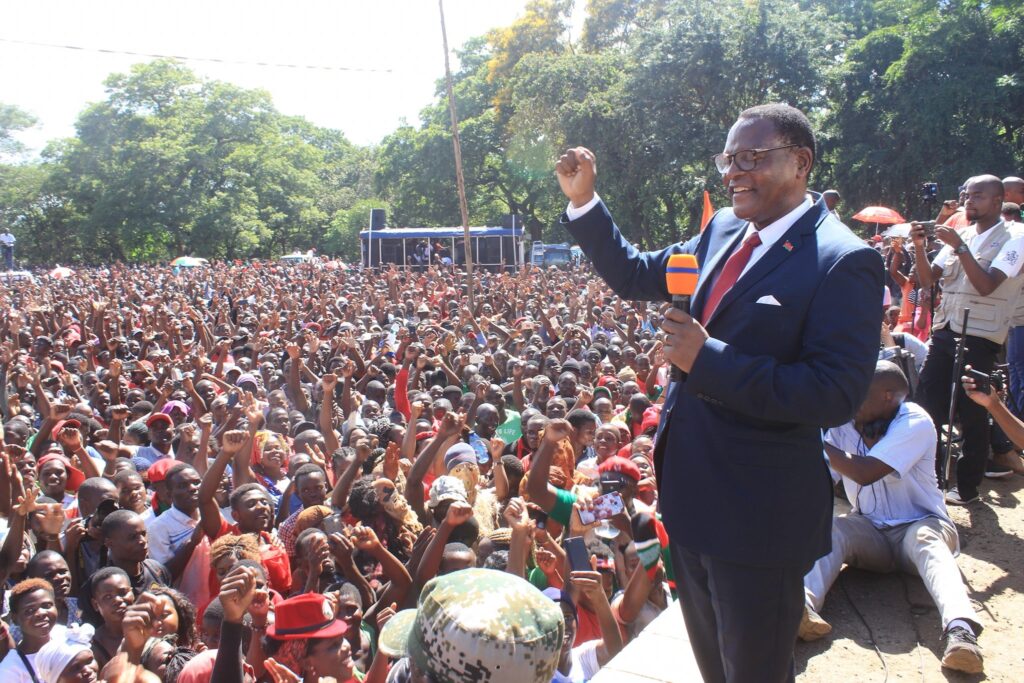Opposition popularity in decline
Electoral trends predict that the Democratic Progressive Party (DPP) and People’s Party (PP) political clout will diminish with time just like former ruling United Democratic Front (UDF).
While analysts doubt the three parties’ chances of ever recapturing their lost glories, DPP, PP and UDF in separate interviews believe they can strategise their way out of what has become a curse of former governing parties.

UDF and once opposition benches fillers Malawi Congress (MCP) both suffered popularity losses in National Assembly elections after being booted out of government.
However, while the former’s decline has continued at an alarming rate since 2004, MCP has been registering recoveries and it is back in government as Tonse Alliance lead partner.
As for DPP, it won a record 114 seats during the 2009 elections, its first national vote participation. However, after fate pushed the party to the opposition following the death of president Bingu wa Mutharika, in 2014 it only won 51 seats, losing 63.
The PP under Joyce Banda, who had taken over the country’s leadership in 2012, scooped 26 seats in the 2014 elections which DPP reclaimed power.

In 2019, DPP, while probably riding the wave of incumbency, gained 11 seats to claim 62 parliamentary positions while PP only won five and lost 21 seats in the process.
In recent setbacks, the DPP has only won a single seat in over 10 parliamentary by-elections while PP has rarely featured representatives and the trend has continued in upcoming elections in Mzimba East, Nkhotakota North-East and Dedza Central East constituencies.
In an interview on Wednesday, PP spokesperson Ackson Kalaile Banda played down suggestions that the party, which is a minority partner in the Tonse Alliance government, falls short of the stamina to rediscover its past popularity.
He defended the party’s no show in a majority of by-elections as strategic: “During the 2019 Tripartite Elections, we had constituencies where we had aspirants. As we focus on restructuring, we decided not to contest by-elections taking place in constituencies that we did not target in the previous elections.”

Kalaile-Banda admitted that being kicked-out of government stunted the party’s growth but was optimistic the party can regain its popularity through a restructuring process that is underway.
“We are restructuring the party. Possibly next week we are having a national executive committee meeting to strategise on how to build the party for the 2025 elections.
“When a party comes out of government, it becomes difficult to mobilise resources. When you are in government you have ministers running up and down government [using public resources], strengthening the party,” he said.
On his part, DPP spokesperson Shadric Namalomba also acknowledged that losing power has affected the party’s battles for parliamentary supremacy. However, he dismissed suggestions that their popularity would erode further.
“In 2009, we had over 100 parliamentarians. However, after he [Bingu wa Mutharika] died more defected and we remained with about 33. This time one of our strengths is that we have tried to be together and we are trying to strengthen the party by bringing in youths into the leadership fold.

“We haven’t really done well during by-elections. This is normal in opposition as you have limited resources as opposed to when you are in power as ministers help in campaigning using some government resources,” he said.
Among other strategies, Namalomba said they are reviewing the party’s constitution to be in line with their political modernity.
He explained: “The president [Peter Mutharika], through the central executive committee, commissioned a functional review to look at why we lost, what are our weaknesses and what are our strengths. We are looking at adopting the recommendations, looking at the constitution, what we stand for; to model them in a way that we are in opposition so that we get back into government.
“We are also going to remove some of the positions to get rid of redundancies and overlaps and we are also going to strengthen our grassroots so that people should honour the party.”
Meanwhile, political analyst Blessings Chinsinga has played down chances of PP and DPP rediscovering their old-selves.
“Chances are very high that they may not recover. The reason being that these political parties are not properly institutionalised as they are formed by families. So, there’s limited ownership that’s why resource mobilisation for them to keep on expanding their parliamentary majorities also becomes limited,” the University of Malawi’s lecturer pointed out.
Another political analyst Eddy Kalonga has also ruled out the three parties ever retaining power soon if they fail to put their houses in order.
“The DPP which is supposed to lead the opposition is busy solving divisions within the party instead of providing checks and balances to the Tonse Alliance government. We literally don’t have opposition. These parties must hold conventions soon to elect leadership that will have time to shape their electoral agenda,” said the United Kingdom Coventry University trained Kalonga who lectures at Unicaf University.
He also said the three parties are disadvantaged because their presidents are not members of Parliament.
“It becomes difficult to control your members of Parliament when you are not a legislator yourself. The other reason MCP has been strong is that its president has always been a parliamentarian. In that setup, it is easy to rally your members behind an agenda,” said Kalonga.
In the first democratically held polls in 1994, MCP, which under dictatorship rule had absolute control over Parliament, scooped 56 seats from the available 177 while UDF won 85 and the Alliance for Democracy (Aford) swept 36.
In 1999, UDF won 93 seats, MCP scaled up to 66 while Aford saw its numbers down to 29 seats.
The three major parties’ popularity suffered setbacks in the 2004 elections as UDF won 49 seats and lost 43, MCP scooped 57 losing nine while Aford only got six and lost 23.
This was the year new parties; Republican Party (15), National Democratic Alliance (9), Movement for Genuine Democratic Change (three) and People’s Progressive Movement (six), got a share of the parliamentary cake.
So strong was UDF prior to 2004 that its leader Bakili Muluzi chided other parties that they would end up like old “curtains”, a prophecy that has come to haunt his own party as it eventually disintegrated at the inception of DPP.
In the 2009 General Elections, out of government UDF and MCP suffered fresh shocks as they recorded their lowest parliamentary tally with the former getting 17 seats and the latter 26. A new kid on the block DPP swept 114 seats.
While UDF has continued to lose seats in the National Assembly as it won 14 in 2014 and 10 in 2019, MCP resurrected and increased its numbers. In 2014, it won 48 seats and 55 in the 2019 elections.
And Chinsinga said MCP has managed to survive and recover from setbacks because it operates as an institution unlike DPP under the Mutharika family, UDF under the former president Bakili Muluzi family and PP under the Joyce Banda family.
He said: “MCP doesn’t belong to anybody but to a collective so there are efforts coming from all over to resuscitate the party unlike other parties which once a family stops funding, they become very weak.
“UDF, DPP and, to some extent PP had an opportunity to build a national headquarters of significance but they failed. That continues to affect them because they don’t have a symbol of existence as independent entities. As a result, meetings continue to be held at houses of party leaders.”
Meanwhile, UDF spokesperson Yusuf Mwawa has said his party stands a chance of retaining power as long as “the Tonse Alliance government continues to perform poorly.”
“When you look at the socio-economic challenges that Malawians are going through, it gives us hope that we can come back into power any time soon. Strategy wise, we are strengthening the grassroots and identifying people that can help revolutionise the party,” he said.
MCP spokesperson the Reverend Maurice Munthali, on the other hand, says the party will not cede power anytime soon, adding it will get a new mandate owing to the transformation they are delivering.
“The 26 years we were in opposition have given us enough lessons. It is not a matter of being in government, but ensuring that the ills the previous regimes perpetrated are wiped out. We will not get out of government before the country is transformed.
“We will deliver beyond expectation so that come campaign, our achievements will be enough to give us a new mandate,” he said.





